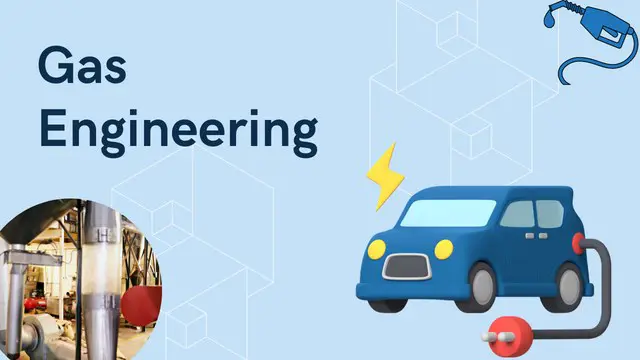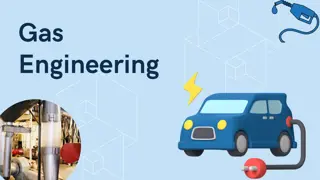
Gas Engineer Level 3 Advanced Diploma
CPD Certified| Free PDF Certificate | Lifetime Access | Learner Support | No Hidden Fees | 100% Success Rate
EDURISE
Summary
- Certificate of completion - Free
- Reed courses certificate of completion - Free
- Tutor is available to students
Add to basket or enquire
Overview
Unlock a World of Opportunities with Gas Engineering Training
Are you ready to step into a dynamic and in-demand field where your expertise is always in need? Gas engineering is a thriving industry with countless opportunities, and our Gas Engineering Training course is your key to unlocking this exciting world.
Why Gas Engineering?
Gas engineering is at the heart of many essential industries, from energy production to manufacturing, and it plays a critical role in keeping our homes and businesses running smoothly. With the world's increasing reliance on energy, the demand for skilled gas engineers is on the rise.
What Our Course Offers:
Comprehensive Knowledge: Our course covers the fundamentals of gas engineering, providing you with a solid foundation in gas systems, safety protocols, and industry standards.
Cutting-Edge Techniques: Stay ahead of the curve with the latest advancements in gas engineering technology and practices.
Problem-Solving Skills: Learn how to troubleshoot and address complex issues, making you a valuable asset in the field.
Safety First: Safety is paramount in gas engineering. Our training emphasizes best practices and protocols to ensure your well-being and that of those you serve.
Industry Insights: Gain insights into the latest industry trends and emerging technologies, positioning yourself as a knowledgeable professional.
Who Should Enroll?
Aspiring Engineers: If you're looking to start a rewarding career in gas engineering, this course provides the foundational knowledge you need.
Current Professionals: Enhance your existing skill set and stay updated with the latest industry standards.
Business Owners: Equip your team with the expertise needed to maintain and optimize gas systems effectively.
Entrepreneurs: If you're considering a venture in the gas engineering sector, this course will give you the knowledge to succeed.
Take the First Step:
Gas engineering is a field with a bright future, and our training is your ticket to becoming a sought-after professional. Enroll in our Gas Engineering Training course today, and start your journey toward a successful and fulfilling career in this high-demand industry. Your expertise will always be in demand, and your opportunities will be limitless. Don't miss out on this chance to secure your future in gas engineering!
FREE GIFT
- Course Completion PDF Certificate
- Tutor Support
Curriculum
Course media
Description
Learning Outcomes for Gas Engineering Training:
Module 1: Introduction to Gas Engineering
- Outcome 1: Understand the fundamentals and importance of gas engineering in various industries.
- Outcome 2: Identify key responsibilities and safety protocols of a gas engineer.
Module 2: Natural Gas Basics and Combustion
- Outcome 1: Comprehend the properties of natural gas and its role in energy production.
- Outcome 2: Analyze the principles of combustion and its relevance in gas engineering.
Module 3: Transmission System: Pipes and Flues
- Outcome 1: Gain insights into the design and operation of gas transmission systems.
- Outcome 2: Evaluate the significance of pipes and flues in ensuring the safe transportation of gas.
Module 4: Ventilation
- Outcome 1: Learn about the importance of proper ventilation in gas systems.
- Outcome 2: Understand the principles of ventilation design and maintenance.
Module 5: Tightness Testing and Gas Leak
- Outcome 1: Master the techniques for conducting tightness tests and detecting gas leaks.
- Outcome 2: Develop skills in addressing and mitigating gas leakages safely.
Module 6: Gas Rate, Flow Meter and Pressure Control
- Outcome 1: Explore the concepts of gas rate measurement, flow meters, and pressure control.
- Outcome 2: Demonstrate proficiency in using instruments for accurate gas flow management.
Module 7: Gas Safety Devices and Controls
- Outcome 1: Understand the various safety devices and control mechanisms employed in gas systems.
- Outcome 2: Implement safety measures and protocols to prevent gas-related accidents.
Module 8: Gas Warning Labelling
- Outcome 1: Recognize the importance of clear and standardized warning labeling in gas engineering.
- Outcome 2: Apply proper labeling techniques to enhance safety and compliance.
Module 9: Chimney Standards and Inspection
- Outcome 1: Comprehend chimney standards and their role in gas appliance ventilation.
- Outcome 2: Perform effective inspections to ensure chimneys meet safety requirements.
Module 10: Gas Appliances Maintenance and Safety
- Outcome 1: Learn the best practices for maintaining and servicing gas appliances.
- Outcome 2: Promote safety while working with gas appliances, minimizing risks and hazards.
Completing this Gas Engineering Training course will equip you with a strong foundation in gas engineering principles, safety practices, and practical skills to excel in this vital industry.
Certificate of Completion
After completing the Gas Engineering diploma course, you will be able to obtain your free PDF certificate of course completion.
Who is this course for?
The ideal audience for this Gas Engineering Training course includes:
Aspiring Gas Engineers: Individuals who are interested in pursuing a career in gas engineering and want to gain foundational knowledge and skills.
Existing Gas Industry Professionals: Current gas industry professionals, such as technicians or maintenance personnel, looking to enhance their expertise and stay updated on industry standards.
Safety and Compliance Officers: Professionals responsible for ensuring safety and regulatory compliance within gas-related operations or facilities.
Facility Managers: Those managing commercial or industrial properties where gas systems are integral and need to ensure proper maintenance and safety.
Construction and Infrastructure Professionals: Individuals involved in the planning, design, and construction of gas infrastructure projects who need a comprehensive understanding of gas engineering.
Environmental and Safety Consultants: Consultants working in the field of environmental and safety regulations, seeking to expand their knowledge of gas safety and standards.
Energy Industry Personnel: Employees in the broader energy sector who require insights into gas engineering for a more holistic understanding of energy systems.
Health and Safety Officers: Professionals responsible for health and safety protocols in workplaces where gas systems are present.
Compliance and Regulatory Personnel: Individuals working for government agencies or organizations responsible for enforcing gas-related regulations and standards.
Renewable Energy Specialists: Experts in renewable energy who want to diversify their knowledge by understanding traditional energy sources, including natural gas.
This course caters to a diverse audience, from beginners with a keen interest in gas engineering to experienced professionals seeking to enhance their expertise. It offers valuable insights into gas systems, safety, and compliance, making it suitable for a wide range of individuals and industries connected to gas engineering.
Requirements
The Gas Engineering course has no formal entry requirements.
Career path
- Gas Engineering Apprentice: Entry-level position with a typical UK salary ranging from £18,000 to £25,000 per year.
- Gas Engineer or Heating Technician: With experience and qualifications, salary can advance to between £26,000 and £45,000 annually.
- Senior Gas Engineer or Gas Safety Inspector: Experienced professionals in these roles may earn £46,000 to £80,000 or more, depending on expertise.
Questions and answers
Hi I’m looking at doing the gas course . I presume this won’t be a level or gas safe course but will it give me the fundamentals
Answer:Yes. You are correct
This was helpful.
Certificates
Certificate of completion
Digital certificate - Included
Reed courses certificate of completion
Digital certificate - Included
Will be downloadable when all lectures have been completed
Reviews
Currently there are no reviews for this course. Be the first to leave a review.
Legal information
This course is advertised on reed.co.uk by the Course Provider, whose terms and conditions apply. Purchases are made directly from the Course Provider, and as such, content and materials are supplied by the Course Provider directly. Reed is acting as agent and not reseller in relation to this course. Reed's only responsibility is to facilitate your payment for the course. It is your responsibility to review and agree to the Course Provider's terms and conditions and satisfy yourself as to the suitability of the course you intend to purchase. Reed will not have any responsibility for the content of the course and/or associated materials.


